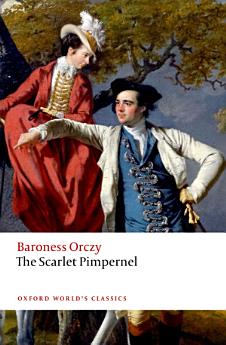The Scarlet Pimpernel
ডিচে ২০১৭ · Oxford University Press
ইবুক
304
পৃষ্ঠা
family_home
যোগ্য
info
reportমূল্যাংকন আৰু পৰ্যালোচনা সত্যাপন কৰা হোৱা নাই অধিক জানক
এই ইবুকখনৰ বিষয়ে
Is he in heaven?-Is he in hell? That demmed, elusive Pimpernel? Sir Percy Blakeney lives a double life in the England of 1792: at home he is an idle fop and a leader of fashion, but in abroad he is the Scarlet Pimpernel, a master of disguise who saves aristocrats from the guillotine. When the revolutionary French state seeks to unmask him, Percy's estranged, independent wife, Marguerite, unwittingly sets their agent on her husband's track. Percy's escapades, and Marguerite's daring journey to France to save him from the guillotine, keep the reader turning the pages of Baroness Orczy's well-paced romantic adventure. Written in just five weeks in 1903, Baroness Emma Orczy's bestseller has been the basis of multiple adaptations. Rooted in the upheaval of Orczy's Hungarian childhood, and in the anxious nationalism of turn-of-the-century Britain, the story of the Scarlet Pimpernel provided a blueprint not only for subsequent historical swashbucklers, but for superheroes from Zorro to Superman. The edition places the book The Scarlet Pimpernel within the context of the elite and popular literature of the turn of the century. Orczy's novel is close in kin to such contemporary political thrillers as Joseph Conrad's The Secret Agent (1907); tales that channelled contemporary concerns about refugees and enemies within.
লিখকৰ বিষয়ে
Nicholas Daly is Professor of Modern English and American Literature at University College Dublin. He has also taught at Trinity College Dublin, Wesleyan University, and Dartmouth College. A member of the Royal Irish Academy, he serves on the advisory boards of the Journal of Victorian Culture, Novel, and the Irish University Review. His academic publications include the monographs Modernism, Romance, and the Fin de Siècle (CUP, 1999), Literature, Technology and Modernity (CUP, 2004), Sensation and Modernity in the 1860s (CUP, 2009), and The Demographic Imagination (CUP, 2015), and many articles on nineteenth and twentieth-century literature and culture.
এই ইবুকখনক মূল্যাংকন কৰক
আমাক আপোনাৰ মতামত জনাওক।
পঢ়াৰ নির্দেশাৱলী
স্মাৰ্টফ’ন আৰু টেবলেট
Android আৰু iPad/iPhoneৰ বাবে Google Play Books এপটো ইনষ্টল কৰক। ই স্বয়ংক্রিয়ভাৱে আপোনাৰ একাউণ্টৰ সৈতে ছিংক হয় আৰু আপুনি য'তে নাথাকক ত'তেই কোনো অডিঅ'বুক অনলাইন বা অফলাইনত শুনিবলৈ সুবিধা দিয়ে।
লেপটপ আৰু কম্পিউটাৰ
আপুনি কম্পিউটাৰৰ ৱেব ব্রাউজাৰ ব্যৱহাৰ কৰি Google Playত কিনা অডিঅ'বুকসমূহ শুনিব পাৰে।
ই-ৰীডাৰ আৰু অন্য ডিভাইচ
Kobo eReadersৰ দৰে ই-চিয়াঁহীৰ ডিভাইচসমূহত পঢ়িবলৈ, আপুনি এটা ফাইল ডাউনল’ড কৰি সেইটো আপোনাৰ ডিভাইচলৈ স্থানান্তৰণ কৰিব লাগিব। সমৰ্থিত ই-ৰিডাৰলৈ ফাইলটো কেনেকৈ স্থানান্তৰ কৰিব জানিবলৈ সহায় কেন্দ্ৰত থকা সবিশেষ নিৰ্দেশাৱলী চাওক।








